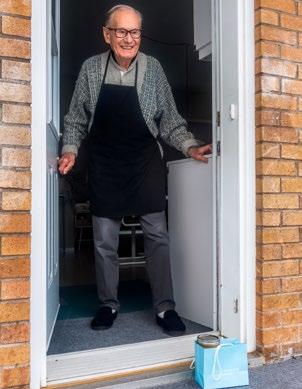
4 minute read
Kind Canadians Start "Caremongering" Trend to Spread Goodwill During Coronavirus Pandemic
Leave it to Canadians to set the standard for kindness during a global pandemic. What started as a way to help vulnerable people in metropolitan cities has now become a widespread "caremongering" movement across the country.
All over the world, kind people have been looking out for members of their communities who have been negatively impacted by the virus. From American musicians streaming free concerts online, to exercises classes held for quarantined residents on their balconies in Spain, times of crisis can often bring out the goodwill in people.
In Canada, Facebook groups have been set up in various cities and towns across the country, with hundreds of thousands of members between them. The acts of kindness are arranged online, with hashtags serving as a record of the good deeds happening across Canadian communities. The groups are described as places "for sharing and organizing community resources in response to COVID-19."
The first group to begin "caremongering" was started by Mita Hans, a social services worker, with the help of Valentina Harper.
"Scaremongering is a big problem," Hans told BBC News in March. "Caremongering has spread the opposite of panic in people, brought out community and camaraderie, and allowed us to tackle the needs of those who are at-risk all the time - now more than ever." "We can't focus on the negative," Harper added. "The only way we can get out of this okay is by being kind to each other."



HOPE FOR HUMANITY
The overwhelming number of Canadians joining the movement and starting local caremongering groups truly speaks to how much people want to be positive and hold onto hope.
"Anxiety, isolation, and lack of hope affects you. In providing this virtual community that allows people to help each other, I think it is really showing people there is still hope for humanity. We haven't lost our hope," Hans explained to BBC News.
As the global pandemic wages on, as have the Facebook groups, garnering a significant number of new members looking for community and a way to help. New posts are split into tags, making it easier to find and provide help, advice, or donations.
Under the hashtag “#NEED,” group members can find volunteers available to help them or their neighbors with tasks that they may be unable to do themselves, like an elderly couple in need of groceries, or volunteers needed for food distribution.
Other hashtags, like #iso or #discussion, provide group members with a way to ask questions about services and programs that may be available, or even get advice about issues they aren’t sure how to deal with. There’s even a hashtag for pets, where members can alert the group if their pets are missing, or find pets to rehome or foster.
The groups provide countless examples of good deeds, from a Halifax man in search of hand sanitizer, to a group of Torontonians offering to cook meals for those who are unable. One of the most popular acts of kindness is to go to the supermarket or grocery store for those who cannot. Amid the panic in most major grocery stores, this one can be harder can it sounds.
Apart from the acts of kindness, the group also serves as a way for people to see goodwill in their communities. For those who do not need help or are unable to give it, the group is a way for community members to restore their faith in humanity and feel less alone. One member told the BBC that the group's ability to "offer emotional support, share information," and "swap ideas of how to pass the time has been life-changing."

THE BUDDY SYSTEM
One caremongering group in Oakville has implemented a new program, called the Buddy System, where each helper is paired with someone in need in their local community. The helper works with the individual in need to get groceries or provide other assistance, as needed. Like many other caremongering groups across Canada, the Caremongering: Oakville group, originally called Oakville Comes Together, was formed when locals felt helpless, looking for ways to spread hope and kindness in a difficult time.
The group now has almost 2,000 members, growing organically through the Oakville, Ontario community. The group promotes programs and aid organizations that members can support (some that were already in place before the pandemic began), and individual services and requests. Local groups have also started initiatives, like the Message in a Bottle campaign, where members of all ages were encouraged to write letters or create artwork to send to isolated seniors in care homes.
“Most of our members focus on the little things that they can do on a daily basis to provide light in a dark time,” said group founder, Lori Sly.
And provide light, they do. Outside of sharing advice and providing assistance, posts in the Caremongering: Oakville group show the true, neighborly spirit that is present in the town. One member, originally from Nova Scotia, shared that she felt hopeful after seeing painted rocks on a nearby trail with “hope,” “love,” and a drawing of a Nova Scotian lighthouse after the attacks in the province left many devastated.
“We have appreciated our group members’ commitment to positive, hopeful messaging and a shared vision to care for our community. A positive culture is difficult to maintain in crisis, but our community embraced this mantra wholeheartedly,” Sly said about the group. “We are honored to administrate this caring group and are proud to call Oakville home.”
While caremongering continues to grow across Canada, we hope to see similar groups arise around the rest of the world - kind hearts can certainly boost togetherness in a time of social isolation.










